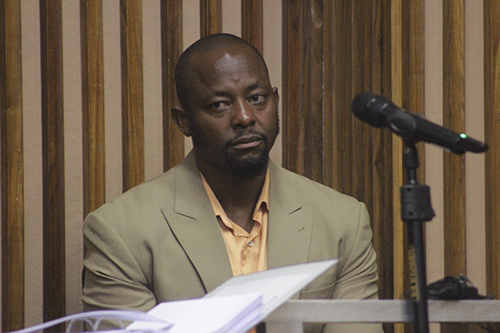Three judges of the High Court differed Friday when judgement in the constitutional challenge lodged by former CEO of Fishcor, Mike Nghipunya, was delivered.
The judgement delivered by acting High Court judges Esi Schimming-Chase and Herman January dismissed the challenge without costs while judge Thomas Masuku upheld the challenge with costs for one instructing and two instructed counsels.
Nghipunya (37) challenged the constitutionality of the words “in the interest of the public or the administration of justice” in section 61 of the Criminal Procedure Act (CPA).
In their judgement, Schimming-Chase and January found that while the phrases are not easy to interpret, Namibian jurisprudence has provided guidelines that can be followed. According to them, section 61 was enacted by the Legislature in response to a significant increase in serious crime, which is even more prevalent today.
They further said that each case is to be decided on its own particular set of facts and circumstances and section 671 is utilized in particular circumstances and for particular types of offences as contained in Part IV of Schedule 2.
The judges further held that a presiding officer is required to conduct a full inquiry into whether or not an accused should be granted bail.
“The discretion although wide, is unfettered in a constitutionally impermissible manner,” they said and continued: Grounds of appeal exist in section 65, and the decision of the presiding officer can be interfered with if the decision is wrong. The presiding officer is an administrator of justice and is mandated to obtain the necessary evidence to do justice. This includes explaining to the accused what its concerns are, especially in relation to the words ‘in the public interest’ and ‘in the interest of justice’.”
They said in their view, section 61 imposes a constitutionally permissible restriction on an accused person that is charged, specifically with an offence contained in schedule 2.
According to them, they declined to make a cost order as the challenge was not capricious or vexatious and was of importance to the public.
In his dissenting judgement, Masuku said that it is extremely difficult for an accused person who is subject to section 61 to be expected to persuade a court that he or she is a worthy candidate for bail, notwithstanding not knowing what the objections in terms of section 61 is.
According to him, the words “in the interest of the public and the administration of justice” are not defined and are vague as not to give sufficient guidance for legal debate and as such renders them unconstitutional for vagueness.
He declared the words “in the interest of the public or the administration of justice” as unconstitutional, null and void and of no force and effect.
He further referred the provision back to the National Assembly for amendment and declared that the declaration of invalidity not take effect within 12 months from the date of the order.
The judge further ordered the respondents to pay for the costs of the application. However, he was overruled by the majority decision of judges Schimming-Chase and January.
According to Masuku, the impugned words place an unreasonable limitation on an applicant’s rights as enshrined in Articles 7, 10, 11, 12, 22, 24 and 25 of the Namibian Constitution.
All in all, the judge said, an applicant in a bail application has the right to know even before he decides to lodge a bail application what the interests of the administration of justice and public interest entail.
The provisions must not make it impossible for an accused to seek his liberty and manifests itself in fullness when he or she is knee-deep in the torrential waters of the bail application and are condemned to either swim or sink.



